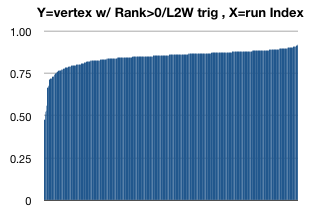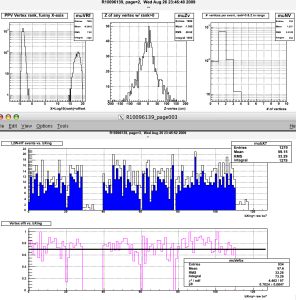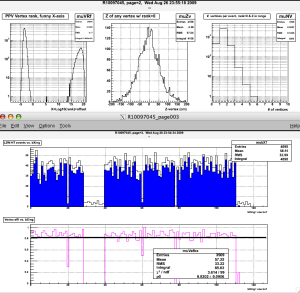QA results of analysis of st_W events
- Basic vertex & event count statistics for all produced runs CVS table
- Vertex efficiency for L2W-ET events is lower at the beginning of the fill,
Computed as ratio of events.
- Vertex efficiency for L2W-ET events does not depend in bXing. Below are 2 runs from begin & end of fill F10505.
Efficiency is from fit of constant to bXing ratio. Statistical errors are ignored.
R10096139, begin of fill, vert eff=70%
R10096139, end of fill, vert eff=82%
Comments from Carl, August 27, 2009 8:19:16 AM EDT
Hi Jan:The time-dependence during the fills is clear. That can arise because extra pile-up confuses the vertex finding, or because extra beam background generates false triggers that one wouldn't expect to have good vertices. My guess is that it is some of both.
Both of those effects should drop over the course of a fill. When I look at the BXing distribution for the end-of-fill run that you posted, I see flat and nearly equal trigger yields in the two abort gaps. Some fraction of that might represent a cosmic ray background; the rest is probably beam-gas. The former should have approximately equal rate in all bunches, no matter whether filled or empty. (Actually, should appear slightly lower in filled bunches, but that's a detail.) For the latter, you should sum the contributions from the two abort gaps to estimate the yield in the filled bunches. My eyeball average says the average number of missed events in the filled bunches is between 1x and 2x that in the abort gaps. Again, that argues that the problem is "some of both".
At the end of the day, you only really care about those cases where a charged track points at your trigger cluster. To look at the issue in a different light, have you estimated the vertex finding efficiency for the restricted event class where there is a global track that points to the trigger?
And for those, it would then be interesting to ask how often that global track also points to the beamline constraint. (Very occasionally, cosmics will; usually, they won't. That can provide a way to estimate that particular background contribution.)Carl



